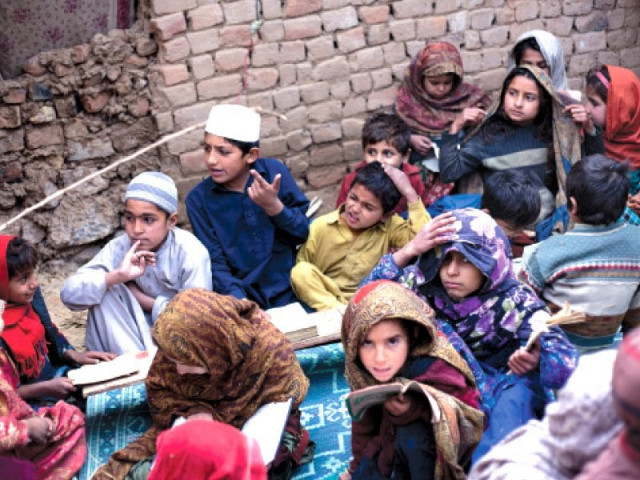I-11 Katchi Abadi: Eviction is the last resort, CDA tells cabinet committee
Civic agency’s enforcement chief wrote to Senate subcommittee saying that voluntary relocation is still being pursued.

Ten-year-old Suleman Gul reacts as he is scolded by his teacher during a Quran study session at a makeshift school in the katchi abadi on Wednesday. PHOTO: MYRA IQBAL/EXPRESS
The Capital Development Authority (CDA) has decided to make forcible eviction of 7,995 residents of a katchi abadi in Sector I-11 its “last resort”.
“A big forced operation is not foreseen and will only be a measure of last resort in consultation with Islamabad Capital Territory (ICT), Rangers, etc,” states a January 8 letter written by CDA’s director enforcement to Ghulam Murtaza, secretary of the Cabinet Committee in the Senate Secretariat. “Peaceful and voluntary shifting is only being resorted to,” the letter adds.
The CDA was given a January 15 deadline by the subcommittee on the Cabinet Secretariat to clear the squatter settlement. The CDA had served notices to the squatters to voluntarily leave the area by January 5 or face an eviction operation.
That date has come and gone, but no operation was launched. Residents say that the past few days have been quiet. They have also received some support from Senator Idrees Khan of Mohmand Agency, who has asked them to form a 12-member committee and meet with him to discuss their concerns.
Most of the residents of the I-11 settlement are from Khyber-Pakhtunkhwa, including 2,878 from Mohmand Agency, according to a survey of the area conducted by the CDA and the United Nations High Commission for Refugees.
However, the CDA’s member estate Shaista Sohail, who is leading the charge on the I-11 Katchi Abadi removal, is unequivocal about the illegality of the settlement.
She is adamant the 1,200 plots allotted by the CDA in 1990 must be cleared of “illegal residents” and handed over to the plot owners. Sohail believes most of the settlement’s residents can afford to rent accommodation in the city.
“We are trying to get the issue resolved amicably by counseling the illegal residents to shift to rented accommodations,” Sohail said.
Yusuf Shah, a resident of ‘Miskeenabad’ — the name residents have given to the settlement — said it was literally impossible for residents to move into rented accommodation.
“Most of the households have 15 to 30 members, some even more,” said Shah, who works at the I-11 vegetable market. “No landlord in the city will rent us a place.”
He said staying in separate accommodations is out of question because of their financial conditions.
“We would not be living in such miserable conditions if we could afford something better,” Shah said, pointing out that some of the homes there do not have electricity or gas.
Raheem Daad, another resident of Miskeenabad, said they are open to leaving the area if the CDA moves them to another location that is close to the vegetable market, where almost all of the settlement’s residents work. “Otherwise, we will not vacate the settlement,” Daad said.

A senior official at the CDA’s estate wing who requested anonymity told The Express Tribune that the CDA is trying to shift some of the poor residents from the settlement to an alternative location.
“The estate wing is consulting with the planning wing to shift the poorest 20 per cent of the residents,” the official said.
There is no indication about how the CDA will select the poorest of the lot, or even the exact location they will be moved to, although one of the proposed locations for resettlement has been identified as being near Rawat.
However, moving to Rawat would mean the livelihoods of the katchi abadi dwellers will be destroyed.
On the other hand, CDA officials are also wary that if they resettle the I-11 katchi abadi residents, they would be setting a precedent for other slum dwellers.
For the I-11/1 residents, the precedent was already established with the allotment of land to Christian settlements in Islamabad and also the move of residents from Haq Bahu — a slum that existed in the I-11 area before IJ Principal Road was built — to Ali Pur Farash.
CDA officials looking after katchi abadis in the capital said only “regular” katchi abadis that existed before 1985 were upgraded or saw their residents allotted land elsewhere.
The officials do not consider the I-11 squatter settlement a regular katchi abadi, although some of its residents claim they have been living there for 40 years.
Some residents like Sanobar Khan approached the district court and managed to get stay orders till January 12 against eviction.
Published in The Express Tribune, January 10th, 2013.



















COMMENTS
Comments are moderated and generally will be posted if they are on-topic and not abusive.
For more information, please see our Comments FAQ